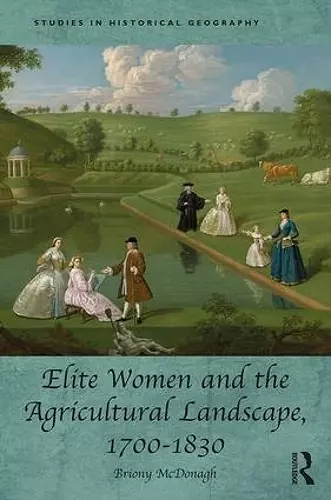Elite Women and the Agricultural Landscape, 1700–1830
Format:Hardback
Publisher:Taylor & Francis Ltd
Published:15th Aug '17
Should be back in stock very soon
This hardback is available in another edition too:
- Paperback£43.99(9780367208219)

Elite Women and the Agricultural Landscape, 1700–1830 offers a detailed study of elite women’s relationships with landed property, specifically as they were mediated through the lens of their estate management and improvement. This highly original book provides an explicitly feminist historical geography of the eighteenth-century English rural landscape. It addresses important questions about propertied women’s role in English rural communities and in Georgian society more generally, whilst contributing to wider cultural debates about women’s place in the environmental, social and economic history of Britain. It will be of interest to those working in Historical and Cultural Geography, Social, Economic and Cultural History, Women’s Studies, Gender Studies and Landscape Studies.
Chapters 2, 3, and 4 of this book are freely available as downloadable Open Access PDFs at http://www.taylorfrancis.com under a Creative Commons Attribution-Non Commercial-No Derivatives (CC-BY-NC-ND) 4.0 license.
"Briony McDonagh’s recent monograph, awarded the Joan Thirsk Memorial Prize, tracks the trials and tribulations of seventy elite female farmers in Georgian England. By illuminating wealthy women’s activities in owning, managing and improving landed property, McDonagh’s study provides an important corrective to a historiographical tradition in which male agrarian improvers have been depicted as authors of the rural landscape and female contributions largely effaced. Meticulously researched and closely written, this slim volume opens up new vistas by challenging analyses positing an increasingly gendered division between private and public spheres during the eighteenth century."
- Elly Robson, Jesus College, University of Cambridge
It is a book that leaves you wanting more; many of the different elements of the book would be worthy of a full- length study in themselves, especially the brief section on women landownership in literature. This, though, is its strength. It covers new ground and provides new questions to be considered, as the author notes herself in the conclusion. As one would hope from a historical geographer, McDonagh has provided an excellent, clear map. I believe it will guide future scholarship in this area for a number of years.
- Ruth Larsen, University of Derby
ISBN: 9781409456025
Dimensions: unknown
Weight: 521g
190 pages